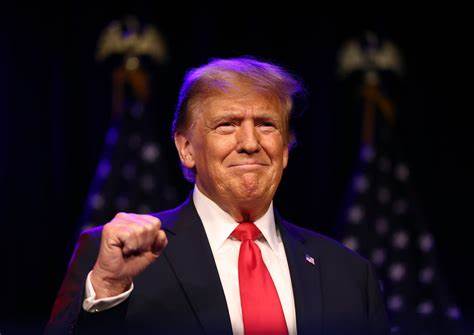BUSINESS

ECOBANK ADVISES NIGERIANS TO TRADE AMONG THEMSELVES, FOLLOWING 50% TARIFF INCREASE BY DONALD TRUMP.
Trade among yourselves to counter trump tariff, Ecobank tells Nigeria, others.
Jeremy Awori, Chief Executive Officer of Ecobank Transnational Inc., has called on African countries to strengthen intra-continental trade as a safeguard against the possible economic fallout from new tariffs introduced by U.S. President Donald Trump.
In an interview with Bloomberg TV, Awori pointed out that the newly imposed tariffs could potentially take the place of the African Growth and Opportunity Act (AGOA)—a trade initiative that has long supported export-driven industries like textiles and apparel across nearly 30 African nations.
Jeremy Awori, the Chief Executive Officer of Ecobank Transnational Inc., has stated that African nations can mitigate the economic impact of the new tariffs imposed by U.S. President Donald Trump by strengthening trade among themselves.
In an interview with Bloomberg TV, Awori explained that the new tariffs could potentially replace the African Growth and Opportunity Act (AGOA), a program that has supported export-driven industries like textiles and apparel in nearly 30 African countries.
He emphasized that boosting intra-African trade would reduce reliance on external markets and foster sustainable economic growth. In 2023, sub-Saharan Africa exported $29 billion worth of goods to the United States, making it the region's fourth-largest export destination, behind China, the United Arab Emirates, and India.
Although the U.S. is not Africa’s largest trading partner, Awori pointed out that the continent could still face indirect effects if the tariffs lead major partners, such as China, to scale back their demand for African exports. He stressed that the ongoing trade tensions underscore the importance of accelerating the implementation of the African Continental Free Trade Area (AfCFTA), which officially launched in October 2022.
The World Bank projects that the African Continental Free Trade Area (AfCFTA) could boost African exports by as much as $560 billion. However, progress on its implementation has been slow, with several key terms still under negotiation.
In 2023, intra-African trade grew by 3.2%, reaching $192 billion, yet it still accounted for just 15% of the continent’s total trade—underscoring the significant untapped potential within regional markets.
Ecobank CEO Jeremy Awori emphasized that merely reducing tariffs is insufficient; African nations must also address non-tariff barriers, such as restrictive visa policies and logistical challenges faced by landlocked countries.
He also pointed out that the new tariffs come shortly after President Trump's decision to freeze U.S. aid to Africa—an action that, according to Ecobank research, could push an additional six million people into extreme poverty.
Awori stressed that fully implementing the AfCFTA, along with prioritizing value addition to raw materials within Africa, would help the continent capture more economic value, create jobs, and improve living standards.
“Now more than ever, African countries must focus on trading more with each other and creating a seamless framework for intra-continental commerce,” he said.
"This represents a significant development in our ongoing coverage of current events."— Editorial Board









